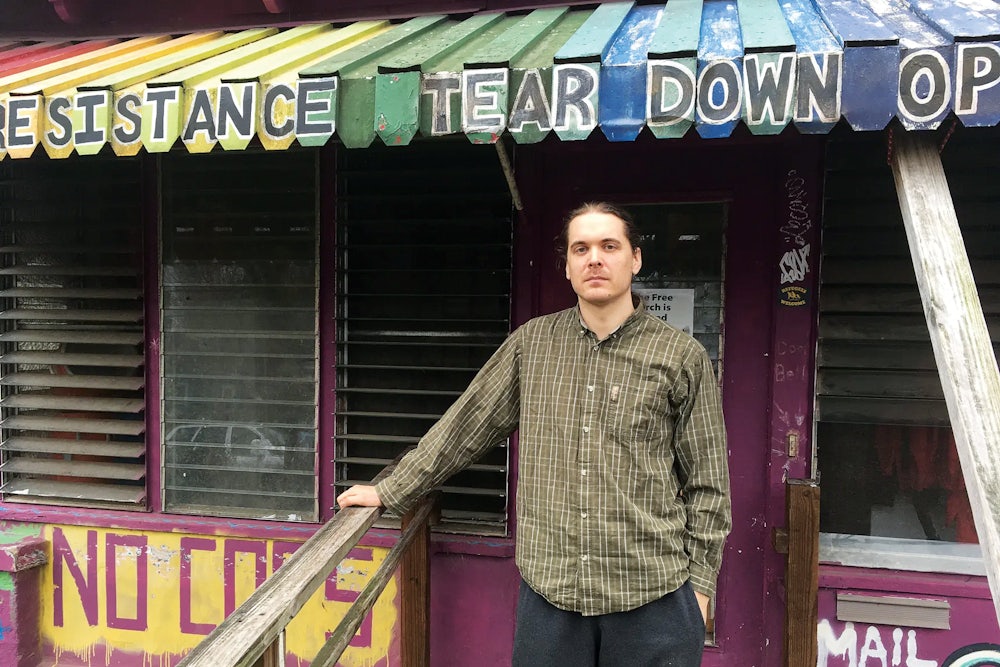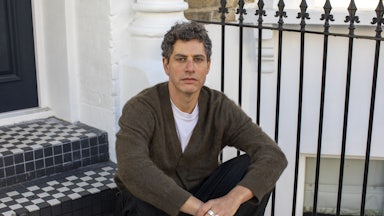When the SWAT team beat down his front door in the early hours of May 31, 2023, Marlon Kautz’s first thought was that it was a mistake. His second thought was that he might die.
From his bedroom, Kautz heard the officers debating whether or not to toss a flash-bang grenade into the living room. The house was surrounded by officers in tactical gear, toting assault rifles, from the Atlanta Police Department and the Georgia Bureau of Investigation. Kautz shouted to the officers that he was coming out, his hands raised. “We kept repeating that we were unarmed,” he told me, as he and his roommates walked out of their rooms as calmly as possible. They were immediately arrested, placed in separate squad cars, and taken to jail, where they were held for the next four days as police “ransacked” their house, searching for evidence to support their case that the group had engaged in charity fraud and money laundering in connection to the “Stop Cop City” movement, a sprawling protest and activism campaign aimed at halting the construction of the massive Atlanta Public Safety Training Center outside the city.
Kautz, alongside his roommates and colleagues Adele MacLean and Savannah Patterson, are members of a nonprofit organization called the Atlanta Solidarity Fund, which has supported local protest movements since 2016 by providing arrested activists with bail funds and legal resources. Their case is an extreme example of how a motivated and militarized government can crack down on protest, dissent, and the civil rights of everyday citizens en masse.
In Atlanta, the raid was a response to years of activism against police violence surrounding “Cop City,” the center’s nickname. But in conversations with The New Republic, legal experts and activists alike said that, in Donald Trump’s second administration, what happened that morning in Atlanta may soon play out all over the country. While our new and former president is known for his high-profile spats with boldface media names, the second Trump administration’s assault on free speech won’t start with CNN but with hundreds, if not thousands, of activists like Kautz across the country, as federal forces seize the precedent that repressive state governments like Georgia’s have been using for years. That dystopian future isn’t far away: New legislation in Congress and new legal cases against groups outside of Georgia show that the right is already devising new tools to stamp out what scant agency Americans have left.
“What’s happening in Atlanta is a vision of the future,” Kautz told me. “This is a test run of a [repressive] playbook that authorities on many different levels are experimenting with to discover what they can get away with.”
The raid on Kautz’s house did not happen in a vacuum. In 2021, Atlanta’s local activists received national attention after an insurgent campaign to oppose the development of the massive police training facility on an 85-acre plot of land morphed into a sprawling social movement centered on a protest encampment there. This movement, known as Defend the Atlanta Forest or Stop Cop City, was the target of police raids in late 2022 and early 2023 involving multiple law enforcement agencies, which violently evicted protesters from their encampments.
One raid, in January 2023, ended with Georgia state troopers fatally shooting a protester, Manuel “Tortuguita” Terán. Terán’s death, in turn, inspired both peaceful and violent street protests in downtown Atlanta and at the former encampment site, culminating in the arrest of dozens of activists. In late 2022, after early efforts to stop the movement proved unsuccessful, Georgia prosecutors started charging protesters en masse with domestic terrorism, a felony that carries a minimum sentence of five years in prison.
“Domestic terrorism” is a difficult term to define. There are 32 states with specific statutes against the crime, many of which were passed following the September 11 terrorist attacks. Georgia’s current law was passed in 2017, after nine parishioners were murdered by a white supremacist during Bible study in a Charleston, South Carolina, church, ostensibly as a provision to prosecute future acts of politically motivated murder and violence. But the law’s language is extremely broad, defining domestic terrorism not only as acts of violence against individuals or groups but also as any attempt to “disable or destroy critical infrastructure” for political ends. Critical infrastructure, in turn, is defined as basically anything owned by the state or used for public services: police cars, roadways, buses, even privately owned assets that are being used for public works. These definitions, several civil rights groups noted at the time, gave Georgia law enforcement a broad mandate to prosecute as terrorists protesters engaged in acts of civil disobedience. For five years, the law sat mostly unused, until it was suddenly applied unilaterally to dozens of Cop City protesters.
The scope of the arrests was shocking. Protesters were charged with domestic terrorism often regardless of their actions. Simply being in proximity to a crime—like the destruction of construction equipment meant for the planned police development, or vandalism of a police vehicle or other public property—was often enough to catch a domestic terrorism charge. In March 2023, police raided a music festival organized near the site of the proposed Cop City facility, arresting both peaceful attendees and members of a splinter protest that burned construction equipment at a nearby location. In total, 42 people have been charged with domestic terrorism in conjunction with the Cop City protests.
It seems unlikely that Georgia prosecutors expected the majority of these charges to stick. In June 2023, DeKalb County District Attorney Sherry Boston announced that her office would not participate in prosecuting the domestic terrorism charges leveled against protesters. But Elizabeth Taxel, a professor at the University of Georgia School of Law and a former public defender, said that for the purposes of the state, the charges themselves are a powerful prosecutorial tool, whether or not they result in convictions. Taxel said, “It seems that the Georgia attorney general’s decision to first charge people with domestic terrorism, and then to indict the case in Fulton County as a [Racketeer Influenced and Corrupt Organizations Act] conspiracy, was a tactical decision.” Domestic terrorism charges, she explained, make it much easier for prosecutors to convince a judge to refuse bail to a suspect or to set exorbitant bond conditions for defendants who are released. Many of the arrested protesters were held for days or weeks in the DeKalb County Jail, which Taxel said her clients have described as “one of the worst places on Earth.” (There have been over a dozen deaths there since 2023, while a 2024 Department of Justice report found that conditions in the facility were both “dangerous and unsanitary.”)
When the defendants get out of jail, the repression continues. Taxel said that Atlanta activists have regularly been saddled with heavily restrictive bond conditions, including court orders to refrain from using social media, communicating with other defendants, and even returning to the area where they were arrested.
“Many believe [this] to be the whole point,” Taxel said. “The state is wielding its charging power to shut down a movement by effectively banning people from being physically present, and signaling to other activists that if you’re participating in any way with this movement, then you are at risk of being charged with domestic terrorism or indicted for racketeering.”
In September 2023, a grand jury led by Georgia’s attorney general indicted 61 people allegedly associated with the Cop City movement, including many prior domestic terrorism defendants as well as Kautz and the staff of the Atlanta Solidarity Fund, on RICO charges. Alleging that the indicted individuals had played pivotal roles in organizing or funding nearly all of the criminal activity that occurred at the Cop City site and several other locations in metro Atlanta over the course of multiple years, the charges made it clear that the prosecution’s ultimate goal was the disruption of the entire movement. Coupled with the charity fraud and money-laundering charges leveled at Kautz, the indictments represented an unprecedented level of coordinated state repression.
“In recent years, Georgia has prosecuted protesters and threatened baseless punishment, weaponizing the law in order to chill free speech,” Cory Isaacson, the legal director of the ACLU of Georgia, said in a statement. “The aim has been to shut down dissent where the State doesn’t want it, which is a direct attack on core First Amendment rights that are critical to a healthy democracy.”
This approach has since spread far beyond Georgia. As campus protests escalated around the country last year, activists started seeing many of these repressive tactics spreading too.
“The new playbook is to crush things as quickly as possible,” said Jeremy, an Atlanta-based activist who asked to use a pseudonym to avoid retribution. Jeremy recalled that when campus protests over Israel’s war in Gaza came to Atlanta, cops cracked down quickly and violently. “Law enforcement agencies have learned [they] cannot allow crowds to gather [or] allow these groups time to build trust and relationships.”
There are signs already that the tactics used to suppress protests in Georgia are being adopted at the federal level. In November of last year, the House of Representatives pushed through H.R. 9495, known as the “nonprofit-killer” bill, which sought to give the incoming Trump administration the power to declare any nonprofit group a “terrorist-supporting organization” and revoke its tax-exempt status. The designation would have an immediate impact on groups like the Atlanta Solidarity Fund that use financial resources to bail protesters out of jail and help them with legal fees, but it could also be weaponized against basically any nonprofit that interacts with public protests.
“If there was going to be a green light for pursuing this kind of thing [nationwide],” Kautz said, “a Trump administration definitely feels like one.”
Pushing back, Kautz argued, will require not only effort on the part of activists but a clear public response when these tactics are used again. There have been no convictions as yet in Georgia’s domestic terrorism or RICO cases. Several charges and whole cases have been dropped.
“The authorities in Georgia have not yet gotten away with this,” Kautz said. “I think it’s likely that they will fail and that they will face accountability. A lot of that depends on the public’s response.”
In the meantime, Atlanta’s activists are refusing to give up.
“My friends haven’t become depoliticized and gone into hiding,” Jeremy said. “They’ve continued to do their best, given the situation. And we all have to be prepared to do that under the second Trump administration.”




